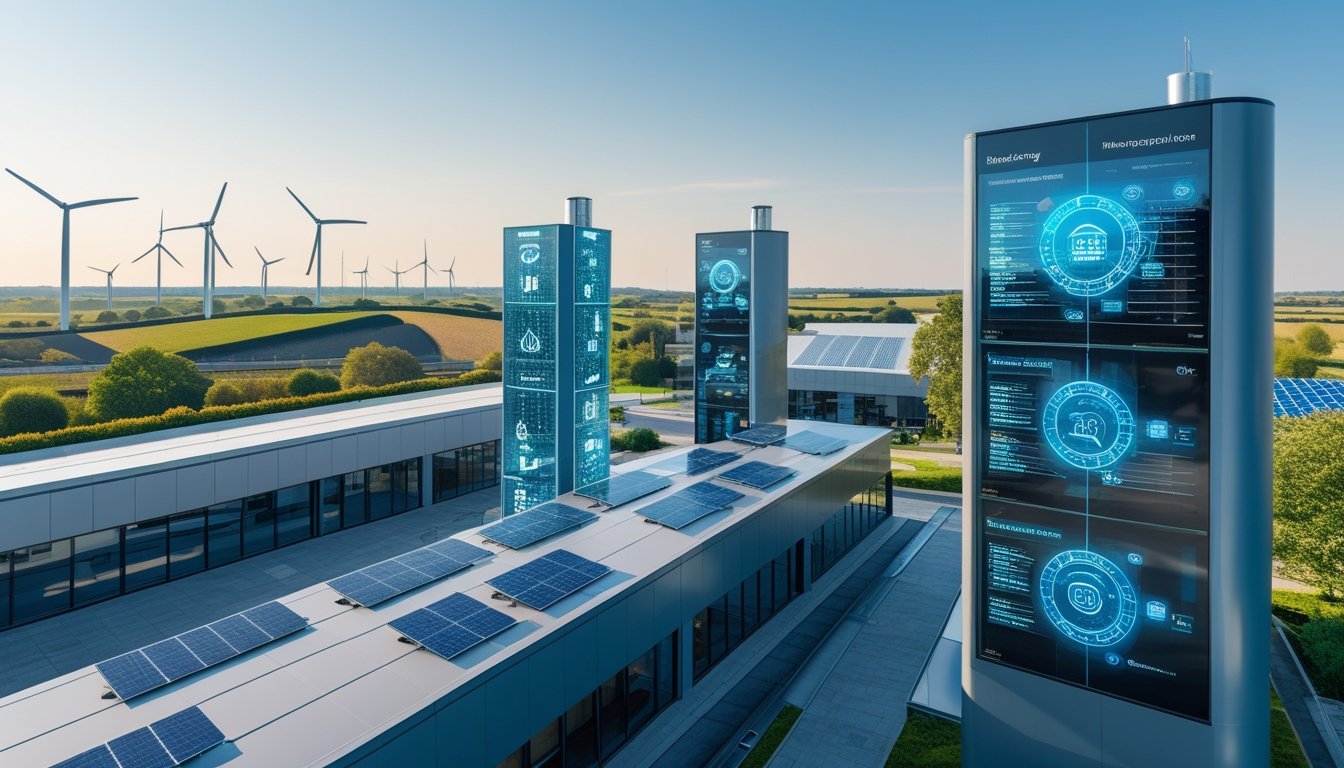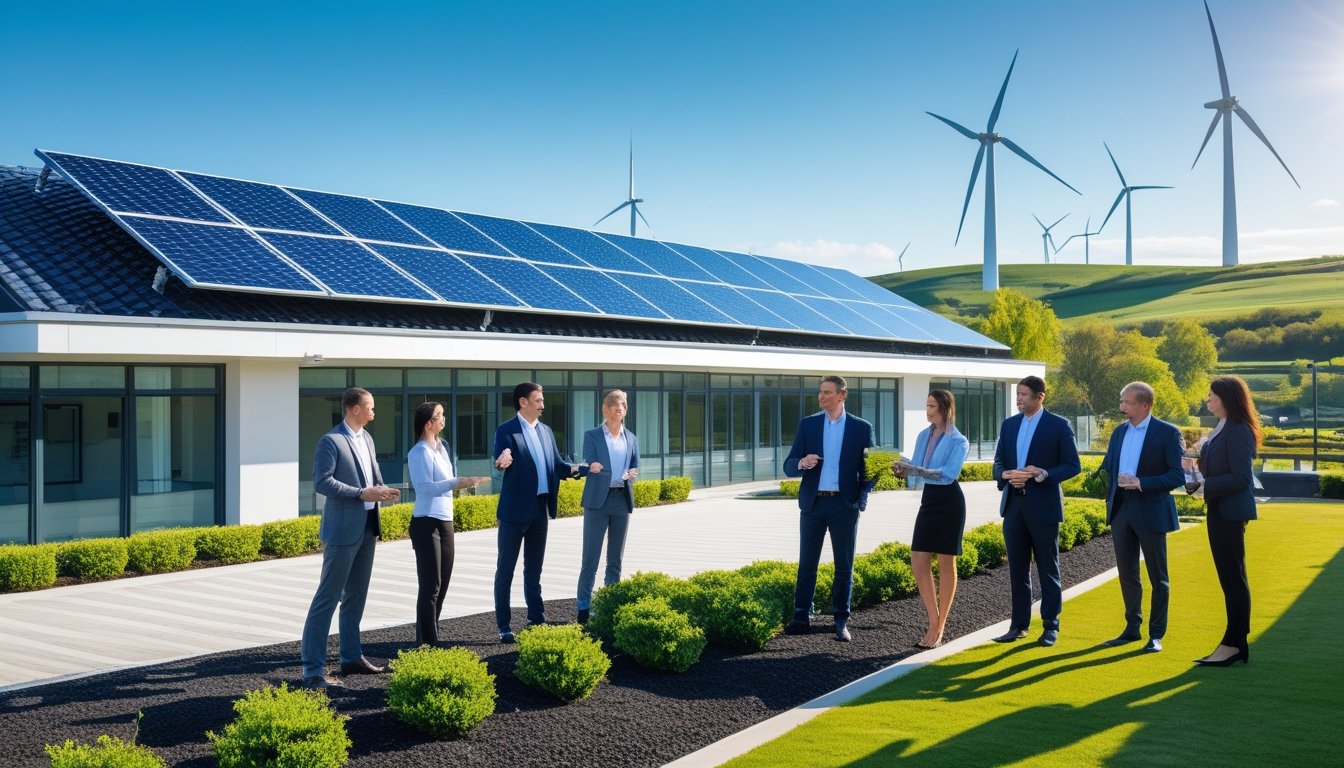Late updated: 19 Nov 2025 14:11
Written by: Amber Collins
The Future Of Renewable Energy In UK Businesses: Advancements and Opportunities
The future of renewable energy in UK businesses appears brighter than ever. With the country's commitment to achieving net-zero emissions by 2050, companies are at the forefront of this transformation. Renewable energy not only offers environmental benefits but also provides UK businesses with economic advantages, including cost savings and enhanced energy independence. This dual benefit makes renewable energy a critical strategy for businesses aiming to thrive in a rapidly changing world.

Our exploration into this topic reveals a landscape ripe with opportunities. As UK businesses continue to adopt solar energy and other clean power solutions, they are discovering new ways to innovate and enhance operational efficiency. The pace of technological advancements and supportive government policies further bolster these efforts, driving a collective movement towards sustainable energy practices.
Understanding this shift is vital for companies looking to remain competitive and resilient. We’ll delve into the various drivers and opportunities, examining how businesses can effectively navigate the transition to renewable energy. Our insights and analyses aim to provide a comprehensive perspective on what lies ahead for renewable energy in UK businesses.
Key Takeaways
- Renewable energy delivers both environmental and economic benefits.
- UK businesses are increasingly adopting clean power solutions.
- Technological and policy advancements support renewable energy growth.
Key Drivers and Opportunities for Renewable Energy In UK Businesses
Renewable energy in UK businesses is influenced by several vital factors that are reshaping our energy strategies. These factors include government policies, cost-effectiveness, and technological advancements, each providing distinct opportunities for sustainable growth and a low-carbon economy.
Government Policy, Net Zero Targets and Corporate Responsibilities
Government policies play an essential role in advancing renewable energy. The UK government has implemented ambitious net-zero targets, aiming for a significant reduction in carbon emissions by 2050. Our commitment to these targets drives businesses to adopt cleaner energy practices and consider carbon capture, utilisation and storage (CCUS) technologies.
Corporations are increasingly being held accountable for their carbon footprints. With regulations tightening, we are witnessing a shift toward more transparent corporate responsibility standards. Businesses aligning with these environmental sustainability goals often gain a competitive edge, attracting environmentally conscious investors and customers.
Cost Savings, Energy Security and Resilience
Adopting renewable energy can lead to substantial cost savings for us. By reducing reliance on fossil fuels, businesses can mitigate the impact of volatile energy prices, thus achieving more predictable budget planning. Energy efficiency measures also contribute to lower energy consumption, enhancing our sustainability profiles.
Energy security is a crucial driver for renewables. By diversifying energy sources, UK businesses improve resilience against supply disruptions. This strategic shift not only enhances operational continuity but also supports a more robust energy sector capable of adapting to changing demands.
Technological Innovations and Energy Sector Collaboration
Technological advancements are pivotal for renewable energy integration in businesses. Innovations in solar, wind, and battery storage technologies are increasing efficiency and reducing costs, making renewable options more accessible for businesses of all sizes.
Collaboration within the energy sector fosters innovation. Public-private partnerships and cooperative research initiatives accelerate the development of cutting-edge solutions. By working together, businesses, governments, and technology leaders can drive substantial progress toward our collective net-zero goals, enhancing our role in the global energy transition.
Adopting Solar Energy and Clean Power Solutions

Embracing solar energy solutions is crucial for UK businesses striving to enhance sustainability, reduce energy costs, and increase energy independence. By integrating commercial solar installations, battery storage, and power purchase agreements, businesses can efficiently harness clean energy, optimise operational costs, and secure energy supply.
Commercial Solar Installations, Rooftop Solar Panels and Solar Farms
Commercial solar installations are an effective way for businesses to cut down on electricity prices. Installing rooftop solar panels directly reduces reliance on the grid. In urban areas, where space is premium, rooftops serve as ideal locations for solar panels, maximising energy capture.
For larger spaces, solar farms offer substantial solar power capacity. These farms make it possible to generate clean electricity at scale, positively impacting a company’s energy efficiency and supply. Utilizing solar farms can bolster our energy security by tapping into renewable energy sources.
Battery Storage and Grid Connection Challenges
Implementing battery storage systems allows businesses to store excess energy generated for later use. This capability minimises reliance on the grid during peak electricity demand periods, thereby reducing energy costs.
Despite its benefits, grid connection poses challenges. Requirements for grid connections can be complex, as we must ensure that any stored energy can be effectively fed back into the grid. Overcoming these challenges involves navigating regulations and technical specifications, impacting both the feasibility and cost of solar solutions.
Power Purchase Agreements, Contracts and Incentives
Power Purchase Agreements (PPAs) offer a viable path for businesses to secure energy at stable prices. By entering into contracts with energy producers, companies can purchase clean energy directly, ensuring price stability and bolstering energy independence.
Government incentives, such as the Smart Export Guarantee and Contracts for Difference (CfD), provide financial support for adopting clean power. These incentives help businesses achieve shorter payback periods on their investments. Additionally, initiatives like the Net Zero Hydrogen Fund present opportunities for innovation and long-term planning in the renewable energy landscape, enhancing our energy security and sustainability efforts.
Frequently Asked Questions

Our focus in this section revolves around the impact of renewable energy targets on business operations, the integration of green technologies into existing systems, and competitive advantages for UK businesses. We will also explore government incentives and policy developments that influence these initiatives.
What are the projected impacts of the UK's renewable energy targets on business operations?
The UK aims to significantly increase the share of renewables in its energy mix, which is set to impact business operations by reducing reliance on fossil fuels. This shift encourages cleaner production, fostering innovation and energy efficiency in various sectors to meet sustainability targets.
How can UK businesses effectively incorporate renewable energy into their existing infrastructure?
Integrating renewable energy can be achieved by upgrading systems with solar panels or wind turbines. Utilising smart grid technology to manage consumption and production efficiently is another method. Expert consultation and investment in modernising infrastructure can make the transition smoother.
What incentives are available to UK businesses for investing in renewable energy?
The UK government offers several incentives, such as tax breaks and grants, to businesses adopting renewable energy solutions. Programmes like the Renewable Heat Incentive and Contracts for Difference help offset initial costs, encouraging more organisations to make sustainable energy investments.
What are the predicted trends in renewable energy costs for UK businesses?
Renewable energy costs continue to fall, driven by technological advancements and increased manufacturing efficiency. As costs decrease, the financial viability of adopting these energy sources grows, making them more accessible and attractive to businesses aiming to cut expenses.
How is the adoption of renewable energy influencing the competitive landscape for businesses in the UK?
Green energy adoption provides a competitive edge, enhancing corporate reputation and meeting consumer demand for sustainability. Early adopters often benefit from reduced operational costs and improved brand loyalty, positioning themselves favourably in an eco-conscious market.
What role do UK regulations and policies play in shaping business investments in renewable energy?
Regulations play a crucial part by mandating emission reductions and setting renewable targets. Policies create a supportive business environment, encouraging investment in clean technologies. Compliance with these regulations also assures alignment with national sustainability goals, promoting long-term financial stability.
